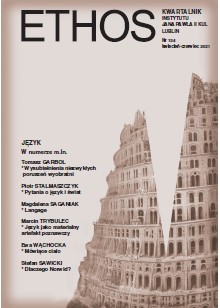ARETOLOGICZNE I WYCHOWAWCZE IMPLIKACJE ZJAWISKA INFLACJI SŁOWA
ARETOLOGICAL AND EDUCATIONAL IMPLICATIONS OF THE INFLATION OF WORDS
Author(s): Piotr Tomasz NowakowskiContributor(s): Patrycja Mikulska (Translator)
Subject(s): Philosophy of Language, Pedagogy
Published by: Katolicki Uniwersytet Lubelski Jana Pawła II - Instytut Jana Pawła II, Wydział Filozofii
Keywords: inflation of words; loquacity; verbosity; aretology; pedagogy;
Summary/Abstract: The author addresses aretological and educational issues related to the contemporary phenomenon of the inflation of words. The development of modern means of communication made it possible for human beings to broadcast their ideas and emotions on a virtually unlimited scale. However, just as an increased supply of money leads to a decrease in its value, an immoderate use of words causes a decline in their importance, as it were, their inflation. Even meaningful words and phrases, if used in excess and without restrain, lose their original significance. The author observes that the mass media have greatly increased the scale of the phenomena, ever present in the history of humankind, of loquacity, or garrulousness, and empty verbosity. By grounding the discussion in the tradition of realistic philosophy, he seeks ways to counteract the tendency in question and finds them in the formation of virtues. In particular, he focuses on prudence in speech, moderation in speech, and speech-related reciprocal justice, including discretion. In his considerations, the author not only explains theoretically what virtue is, but also proposes some educational guidelines. To control one’s language and to develop the relevant skills, one needs to ground one’s educational and self-educational efforts in a threefold ability: to speak, to be silent, and to listen.
Journal: Ethos. Kwartalnik Instytutu Jana Pawła II KUL
- Issue Year: 34/2021
- Issue No: 2
- Page Range: 364-378
- Page Count: 15
- Language: Polish
- Content File-PDF

